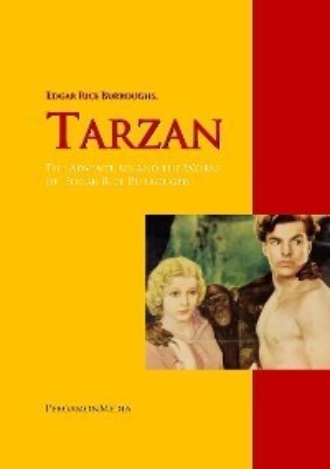
Полная версия
Tarzan: The Adventures and the Works of Edgar Rice Burroughs
Professor Porter was there, and Mr. Philander and Clayton, with Lieutenant Charpentier and two of his brother officers, while Esmeralda hovered in the background, ever and anon venturing opinions and comments with the freedom of an old and much-indulged family servant.
The officers arose and saluted as their superior approached, and Clayton surrendered his camp stool to Jane.
"We were just discussing poor Paul's fate," said Captain Dufranne. "Miss Porter insists that we have no absolute proof of his death—nor have we. And on the other hand she maintains that the continued absence of your omnipotent jungle friend indicates that D'Arnot is still in need of his services, either because he is wounded, or still is a prisoner in a more distant native village."
"It has been suggested," ventured Lieutenant Charpentier, "that the wild man may have been a member of the tribe of blacks who attacked our party—that he was hastening to aid THEM—his own people."
Jane shot a quick glance at Clayton.
"It seems vastly more reasonable," said Professor Porter.
"I do not agree with you," objected Mr. Philander. "He had ample opportunity to harm us himself, or to lead his people against us. Instead, during our long residence here, he has been uniformly consistent in his role of protector and provider."
"That is true," interjected Clayton, "yet we must not overlook the fact that except for himself the only human beings within hundreds of miles are savage cannibals. He was armed precisely as are they, which indicates that he has maintained relations of some nature with them, and the fact that he is but one against possibly thousands suggests that these relations could scarcely have been other than friendly."
"It seems improbable then that he is not connected with them," remarked the captain; "possibly a member of this tribe."
"Otherwise," added another of the officers, "how could he have lived a sufficient length of time among the savage denizens of the jungle, brute and human, to have become proficient in woodcraft, or in the use of African weapons."
"You are judging him according to your own standards, gentlemen," said Jane. "An ordinary white man such as any of you—pardon me, I did not mean just that—rather, a white man above the ordinary in physique and intelligence could never, I grant you, have lived a year alone and naked in this tropical jungle; but this man not only surpasses the average white man in strength and agility, but as far transcends our trained athletes and 'strong men' as they surpass a day-old babe; and his courage and ferocity in battle are those of the wild beast."
"He has certainly won a loyal champion, Miss Porter," said Captain Dufranne, laughing. "I am sure that there be none of us here but would willingly face death a hundred times in its most terrifying forms to deserve the tributes of one even half so loyal—or so beautiful."
"You would not wonder that I defend him," said the girl, "could you have seen him as I saw him, battling in my behalf with that huge hairy brute.
"Could you have seen him charge the monster as a bull might charge a grizzly—absolutely without sign of fear or hesitation—you would have believed him more than human.
"Could you have seen those mighty muscles knotting under the brown skin—could you have seen them force back those awful fangs—you too would have thought him invincible.
"And could you have seen the chivalrous treatment which he accorded a strange girl of a strange race, you would feel the same absolute confidence in him that I feel."
"You have won your suit, my fair pleader," cried the captain. "This court finds the defendant not guilty, and the cruiser shall wait a few days longer that he may have an opportunity to come and thank the divine Portia."
"For the Lord's sake honey," cried Esmeralda. "You all don't mean to tell ME that you're going to stay right here in this here land of carnivable animals when you all got the opportunity to escapade on that boat? Don't you tell me THAT, honey."
"Why, Esmeralda! You should be ashamed of yourself," cried Jane. "Is this any way to show your gratitude to the man who saved your life twice?"
"Well, Miss Jane, that's all jest as you say; but that there forest man never did save us to stay here. He done save us so we all could get AWAY from here. I expect he be mighty peevish when he find we ain't got no more sense than to stay right here after he done give us the chance to get away.
"I hoped I'd never have to sleep in this here geological garden another night and listen to all them lonesome noises that come out of that jumble after dark."
"I don't blame you a bit, Esmeralda," said Clayton, "and you certainly did hit it off right when you called them 'lonesome' noises. I never have been able to find the right word for them but that's it, don't you know, lonesome noises."
"You and Esmeralda had better go and live on the cruiser," said Jane, in fine scorn. "What would you think if you HAD to live all of your life in that jungle as our forest man has done?"
"I'm afraid I'd be a blooming bounder as a wild man," laughed Clayton, ruefully. "Those noises at night make the hair on my head bristle. I suppose that I should be ashamed to admit it, but it's the truth."
"I don't know about that," said Lieutenant Charpentier. "I never thought much about fear and that sort of thing—never tried to determine whether I was a coward or brave man; but the other night as we lay in the jungle there after poor D'Arnot was taken, and those jungle noises rose and fell around us I began to think that I was a coward indeed. It was not the roaring and growling of the big beasts that affected me so much as it was the stealthy noises—the ones that you heard suddenly close by and then listened vainly for a repetition of—the unaccountable sounds as of a great body moving almost noiselessly, and the knowledge that you didn't KNOW how close it was, or whether it were creeping closer after you ceased to hear it? It was those noises—and the eyes.
"MON DIEU! I shall see them in the dark forever—the eyes that you see, and those that you don't see, but feel—ah, they are the worst."
All were silent for a moment, and then Jane spoke.
"And he is out there," she said, in an awe-hushed whisper. "Those eyes will be glaring at him to-night, and at your comrade Lieutenant D'Arnot. Can you leave them, gentlemen, without at least rendering them the passive succor which remaining here a few days longer might insure them?"
"Tut, tut, child," said Professor Porter. "Captain Dufranne is willing to remain, and for my part I am perfectly willing, perfectly willing—as I always have been to humor your childish whims."
"We can utilize the morrow in recovering the chest, Professor," suggested Mr. Philander.
"Quite so, quite so, Mr. Philander, I had almost forgotten the treasure," exclaimed Professor Porter. "Possibly we can borrow some men from Captain Dufranne to assist us, and one of the prisoners to point out the location of the chest."
"Most assuredly, my dear Professor, we are all yours to command," said the captain.
And so it was arranged that on the next day Lieutenant Charpentier was to take a detail of ten men, and one of the mutineers of the Arrow as a guide, and unearth the treasure; and that the cruiser would remain for a full week in the little harbor. At the end of that time it was to be assumed that D'Arnot was truly dead, and that the forest man would not return while they remained. Then the two vessels were to leave with all the party.
Professor Porter did not accompany the treasure-seekers on the following day, but when he saw them returning empty-handed toward noon, he hastened forward to meet them—his usual preoccupied indifference entirely vanished, and in its place a nervous and excited manner.
"Where is the treasure?" he cried to Clayton, while yet a hundred feet separated them.
Clayton shook his head.
"Gone," he said, as he neared the professor.
"Gone! It cannot be. Who could have taken it?" cried Professor Porter.
"God only knows, Professor," replied Clayton. "We might have thought the fellow who guided us was lying about the location, but his surprise and consternation on finding no chest beneath the body of the murdered Snipes were too real to be feigned. And then our spades showed us that SOMETHING had been buried beneath the corpse, for a hole had been there and it had been filled with loose earth."
"But who could have taken it?" repeated Professor Porter.
"Suspicion might naturally fall on the men of the cruiser," said Lieutenant Charpentier, "but for the fact that sub-lieutenant Janviers here assures me that no men have had shore leave—that none has been on shore since we anchored here except under command of an officer. I do not know that you would suspect our men, but I am glad that there is now no chance for suspicion to fall on them," he concluded.
"It would never have occurred to me to suspect the men to whom we owe so much," replied Professor Porter, graciously. "I would as soon suspect my dear Clayton here, or Mr. Philander."
The Frenchmen smiled, both officers and sailors. It was plain to see that a burden had been lifted from their minds.
"The treasure has been gone for some time," continued Clayton. "In fact the body fell apart as we lifted it, which indicates that whoever removed the treasure did so while the corpse was still fresh, for it was intact when we first uncovered it."
"There must have been several in the party," said Jane, who had joined them. "You remember that it took four men to carry it."
"By jove!" cried Clayton. "That's right. It must have been done by a party of blacks. Probably one of them saw the men bury the chest and then returned immediately after with a party of his friends, and carried it off."
"Speculation is futile," said Professor Porter sadly. "The chest is gone. We shall never see it again, nor the treasure that was in it."
Only Jane knew what the loss meant to her father, and none there knew what it meant to her.
Six days later Captain Dufranne announced that they would sail early on the morrow.
Jane would have begged for a further reprieve, had it not been that she too had begun to believe that her forest lover would return no more.
In spite of herself she began to entertain doubts and fears. The reasonableness of the arguments of these disinterested French officers commenced to convince her against her will.
That he was a cannibal she would not believe, but that he was an adopted member of some savage tribe at length seemed possible to her.
She would not admit that he could be dead. It was impossible to believe that that perfect body, so filled with triumphant life, could ever cease to harbor the vital spark—as soon believe that immortality were dust.
As Jane permitted herself to harbor these thoughts, others equally unwelcome forced themselves upon her.
If he belonged to some savage tribe he had a savage wife—a dozen of them perhaps—and wild, half-caste children. The girl shuddered, and when they told her that the cruiser would sail on the morrow she was almost glad.
It was she, though, who suggested that arms, ammunition, supplies and comforts be left behind in the cabin, ostensibly for that intangible personality who had signed himself Tarzan of the Apes, and for D'Arnot should he still be living, but really, she hoped, for her forest god—even though his feet should prove of clay.
And at the last minute she left a message for him, to be transmitted by Tarzan of the Apes.
She was the last to leave the cabin, returning on some trivial pretext after the others had started for the boat.
She kneeled down beside the bed in which she had spent so many nights, and offered up a prayer for the safety of her primeval man, and crushing his locket to her lips she murmured:
"I love you, and because I love you I believe in you. But if I did not believe, still should I love. Had you come back for me, and had there been no other way, I would have gone into the jungle with you—forever."
Chapter XXV
The Outpost of the World
With the report of his gun D'Arnot saw the door fly open and the figure of a man pitch headlong within onto the cabin floor.
The Frenchman in his panic raised his gun to fire again into the prostrate form, but suddenly in the half dusk of the open door he saw that the man was white and in another instant realized that he had shot his friend and protector, Tarzan of the Apes.
With a cry of anguish D'Arnot sprang to the ape-man's side, and kneeling, lifted the latter's head in his arms—calling Tarzan's name aloud.
There was no response, and then D'Arnot placed his ear above the man's heart. To his joy he heard its steady beating beneath.
Carefully he lifted Tarzan to the cot, and then, after closing and bolting the door, he lighted one of the lamps and examined the wound.
The bullet had struck a glancing blow upon the skull. There was an ugly flesh wound, but no signs of a fracture of the skull.
D'Arnot breathed a sigh of relief, and went about bathing the blood from Tarzan's face.
Soon the cool water revived him, and presently he opened his eyes to look in questioning surprise at D'Arnot.
The latter had bound the wound with pieces of cloth, and as he saw that Tarzan had regained consciousness he arose and going to the table wrote a message, which he handed to the ape-man, explaining the terrible mistake he had made and how thankful he was that the wound was not more serious.
Tarzan, after reading the message, sat on the edge of the couch and laughed.
"It is nothing," he said in French, and then, his vocabulary failing him, he wrote:
You should have seen what Bolgani did to me, and Kerchak, and Terkoz, before I killed them—then you would laugh at such a little scratch.
D'Arnot handed Tarzan the two messages that had been left for him.
Tarzan read the first one through with a look of sorrow on his face. The second one he turned over and over, searching for an opening—he had never seen a sealed envelope before. At length he handed it to D'Arnot.
The Frenchman had been watching him, and knew that Tarzan was puzzled over the envelope. How strange it seemed that to a full-grown white man an envelope was a mystery. D'Arnot opened it and handed the letter back to Tarzan.
Sitting on a camp stool the ape-man spread the written sheet before him and read:
TO TARZAN OF THE APES:
Before I leave let me add my thanks to those of Mr. Clayton for the kindness you have shown in permitting us the use of your cabin.
That you never came to make friends with us has been a great regret to us. We should have liked so much to have seen and thanked our host.
There is another I should like to thank also, but he did not come back, though I cannot believe that he is dead.
I do not know his name. He is the great white giant who wore the diamond locket upon his breast.
If you know him and can speak his language carry my thanks to him, and tell him that I waited seven days for him to return.
Tell him, also, that in my home in America, in the city of Baltimore, there will always be a welcome for him if he cares to come.
I found a note you wrote me lying among the leaves beneath a tree near the cabin. I do not know how you learned to love me, who have never spoken to me, and I am very sorry if it is true, for I have already given my heart to another.
But know that I am always your friend,
JANE PORTER.
Tarzan sat with gaze fixed upon the floor for nearly an hour. It was evident to him from the notes that they did not know that he and Tarzan of the Apes were one and the same.
"I have given my heart to another," he repeated over and over again to himself.
Then she did not love him! How could she have pretended love, and raised him to such a pinnacle of hope only to cast him down to such utter depths of despair!
Maybe her kisses were only signs of friendship. How did he know, who knew nothing of the customs of human beings?
Suddenly he arose, and, bidding D'Arnot good night as he had learned to do, threw himself upon the couch of ferns that had been Jane Porter's.
D'Arnot extinguished the lamp, and lay down upon the cot.
For a week they did little but rest, D'Arnot coaching Tarzan in French. At the end of that time the two men could converse quite easily.
One night, as they were sitting within the cabin before retiring, Tarzan turned to D'Arnot.
"Where is America?" he said.
D'Arnot pointed toward the northwest.
"Many thousands of miles across the ocean," he replied. "Why?"
"I am going there."
D'Arnot shook his head.
"It is impossible, my friend," he said.
Tarzan rose, and, going to one of the cupboards, returned with a well-thumbed geography.
Turning to a map of the world, he said:
"I have never quite understood all this; explain it to me, please."
When D'Arnot had done so, showing him that the blue represented all the water on the earth, and the bits of other colors the continents and islands, Tarzan asked him to point out the spot where they now were.
D'Arnot did so.
"Now point out America," said Tarzan.
And as D'Arnot placed his finger upon North America, Tarzan smiled and laid his palm upon the page, spanning the great ocean that lay between the two continents.
"You see it is not so very far," he said; "scarce the width of my hand."
D'Arnot laughed. How could he make the man understand?
Then he took a pencil and made a tiny point upon the shore of Africa.
"This little mark," he said, "is many times larger upon this map than your cabin is upon the earth. Do you see now how very far it is?"
Tarzan thought for a long time.
"Do any white men live in Africa?" he asked.
"Yes."
"Where are the nearest?"
D'Arnot pointed out a spot on the shore just north of them.
"So close?" asked Tarzan, in surprise.
"Yes," said D'Arnot; "but it is not close."
"Have they big boats to cross the ocean?"
"Yes."
"We shall go there to-morrow," announced Tarzan.
Again D'Arnot smiled and shook his head.
"It is too far. We should die long before we reached them."
"Do you wish to stay here then forever?" asked Tarzan.
"No," said D'Arnot.
"Then we shall start to-morrow. I do not like it here longer. I should rather die than remain here."
"Well," answered D'Arnot, with a shrug, "I do not know, my friend, but that I also would rather die than remain here. If you go, I shall go with you."
"It is settled then," said Tarzan. "I shall start for America to-morrow."
"How will you get to America without money?" asked D'Arnot.
"What is money?" inquired Tarzan.
It took a long time to make him understand even imperfectly.
"How do men get money?" he asked at last.
"They work for it."
"Very well. I will work for it, then."
"No, my friend," returned D'Arnot, "you need not worry about money, nor need you work for it. I have enough money for two—enough for twenty. Much more than is good for one man and you shall have all you need if ever we reach civilization."
So on the following day they started north along the shore. Each man carrying a rifle and ammunition, beside bedding and some food and cooking utensils.
The latter seemed to Tarzan a most useless encumbrance, so he threw his away.
"But you must learn to eat cooked food, my friend," remonstrated D'Arnot. "No civilized men eat raw flesh."
"There will be time enough when I reach civilization," said Tarzan. "I do not like the things and they only spoil the taste of good meat."
For a month they traveled north. Sometimes finding food in plenty and again going hungry for days.
They saw no signs of natives nor were they molested by wild beasts. Their journey was a miracle of ease.
Tarzan asked questions and learned rapidly. D'Arnot taught him many of the refinements of civilization—even to the use of knife and fork; but sometimes Tarzan would drop them in disgust and grasp his food in his strong brown hands, tearing it with his molars like a wild beast.
Then D'Arnot would expostulate with him, saying:
"You must not eat like a brute, Tarzan, while I am trying to make a gentleman of you. MON DIEU! Gentlemen do not thus—it is terrible."
Tarzan would grin sheepishly and pick up his knife and fork again, but at heart he hated them.
On the journey he told D'Arnot about the great chest he had seen the sailors bury; of how he had dug it up and carried it to the gathering place of the apes and buried it there.
"It must be the treasure chest of Professor Porter," said D'Arnot. "It is too bad, but of course you did not know."
Then Tarzan recalled the letter written by Jane to her friend—the one he had stolen when they first came to his cabin, and now he knew what was in the chest and what it meant to Jane.
"To-morrow we shall go back after it," he announced to D'Arnot.
"Go back?" exclaimed D'Arnot. "But, my dear fellow, we have now been three weeks upon the march. It would require three more to return to the treasure, and then, with that enormous weight which required, you say, four sailors to carry, it would be months before we had again reached this spot."
"It must be done, my friend," insisted Tarzan. "You may go on toward civilization, and I will return for the treasure. I can go very much faster alone."
"I have a better plan, Tarzan," exclaimed D'Arnot. "We shall go on together to the nearest settlement, and there we will charter a boat and sail back down the coast for the treasure and so transport it easily. That will be safer and quicker and also not require us to be separated. What do you think of that plan?"
"Very well," said Tarzan. "The treasure will be there whenever we go for it; and while I could fetch it now, and catch up with you in a moon or two, I shall feel safer for you to know that you are not alone on the trail. When I see how helpless you are, D'Arnot, I often wonder how the human race has escaped annihilation all these ages which you tell me about. Why, Sabor, single handed, could exterminate a thousand of you."
D'Arnot laughed.
"You will think more highly of your genus when you have seen its armies and navies, its great cities, and its mighty engineering works. Then you will realize that it is mind, and not muscle, that makes the human animal greater than the mighty beasts of your jungle.
"Alone and unarmed, a single man is no match for any of the larger beasts; but if ten men were together, they would combine their wits and their muscles against their savage enemies, while the beasts, being unable to reason, would never think of combining against the men. Otherwise, Tarzan of the Apes, how long would you have lasted in the savage wilderness?"
"You are right, D'Arnot," replied Tarzan, "for if Kerchak had come to Tublat's aid that night at the Dum-Dum, there would have been an end of me. But Kerchak could never think far enough ahead to take advantage of any such opportunity. Even Kala, my mother, could never plan ahead. She simply ate what she needed when she needed it, and if the supply was very scarce, even though she found plenty for several meals, she would never gather any ahead.
"I remember that she used to think it very silly of me to burden myself with extra food upon the march, though she was quite glad to eat it with me, if the way chanced to be barren of sustenance."
"Then you knew your mother, Tarzan?" asked D'Arnot, in surprise.
"Yes. She was a great, fine ape, larger than I, and weighing twice as much."
"And your father?" asked D'Arnot.
"I did not know him. Kala told me he was a white ape, and hairless like myself. I know now that he must have been a white man."
D'Arnot looked long and earnestly at his companion.
"Tarzan," he said at length, "it is impossible that the ape, Kala, was your mother. If such a thing can be, which I doubt, you would have inherited some of the characteristics of the ape, but you have not—you are pure man, and, I should say, the offspring of highly bred and intelligent parents. Have you not the slightest clue to your past?"
"Not the slightest," replied Tarzan.
"No writings in the cabin that might have told something of the lives of its original inmates?"






